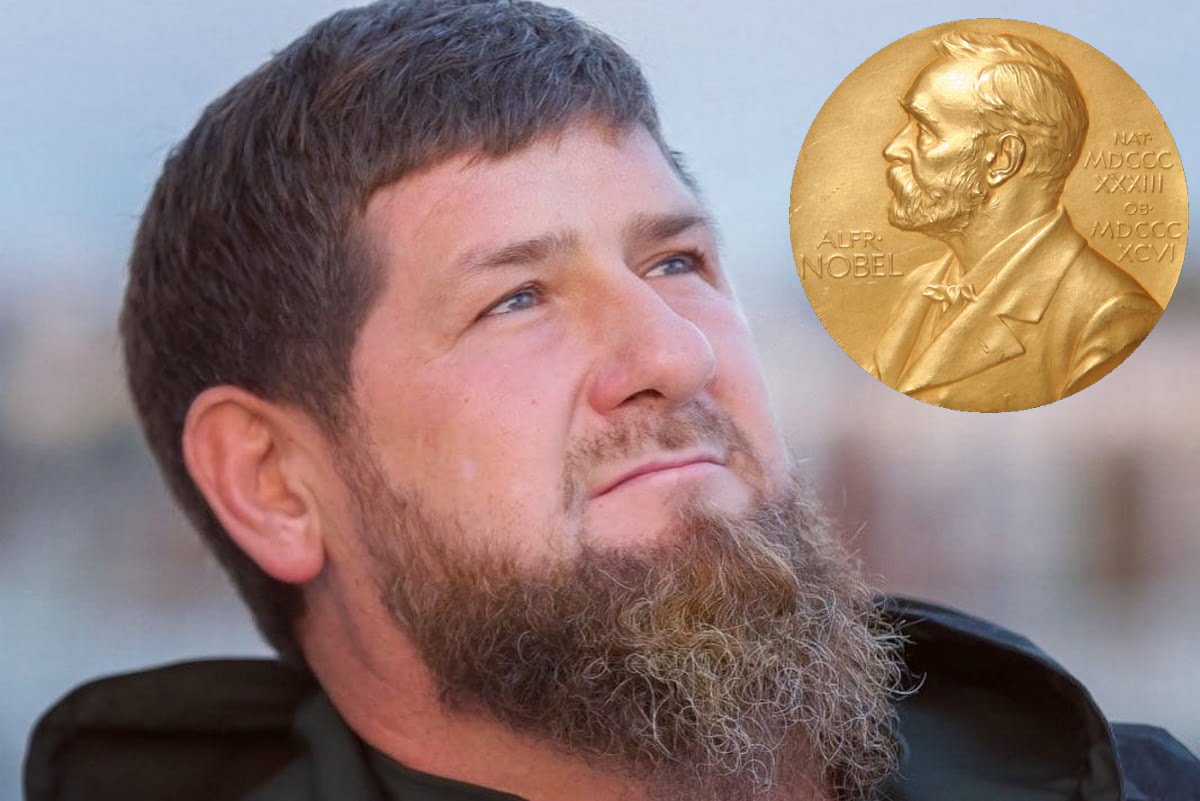On March 31, some media reported that the head of Chechnya, Ramzan Kadyrov, had been nominated to receive one of the most prestigious world awards. We checked how plausible this information is.
This check is the result of the joint work of fact checkers from “Verified” and Fakecheck. Share this material if you liked it. This way you will help the development of fact-checking in Russia.
The news, which some considered April Fools' (it was on this day that it spread), first appeared on the website of the online Tambov.ru news agency. Here it is text:
“The head of the Chechen Republic, Ramzan Kadyrov, has been nominated for the 2021 Nobel Peace Prize. The president of the International Information Nobel Center (INTC) Vyacheslav Tyutyunnik told the editors of the online Tambov.ru news agency. It is noted that Ramzan Kadyrov, who is a Doctor of Economic Sciences, was nominated “for his outstanding contribution to establishing and maintaining reliable peace in the historically difficult Chechen region over the past 15 years.” <…> Let us recall that the International Nobel Information Center in Tambov has been collecting and analyzing the works of prize winners for more than 30 years. There is a unique museum dedicated to the Nobel family. It opened long before the museum in Stockholm.”
Almost immediately this news spread website Chechen State Television and Radio Company. And already on April 1, more popular media outlets wrote about the news: Life, "RIA Novosti", "Kommersant"and many others. There were also new details about the nomination. In particular, Life Tyutyunnik literally stated the following: “I have such information that he was nominated for the Nobel Peace Prize. It wasn’t me who initiated it, I just know the people who nominated it, and they told me this in confidence.” But for the portal “Caucasus.Realities” the Tambov professor slightly opened it slightly a veil of secrecy: “The Norwegians put him forward. According to the rules of the award, nominators are kept secret and become known only after 50 years.” And he added: “More than 300 people have already been nominated this year. It is not possible for a nominee to win the Nobel Prize the first time. Judging by publicly available declassified information, it takes years, and sometimes decades, to be nominated to receive the award. It won't work the first time. In our 120-year history, only in a few exceptional cases has something like this happened.” High-ranking officials also commented on the news officials Chechnya.
As you can see, the primary source of the news was a certain Vyacheslav Tyutyunnik, president of an organization called the International Nobel Information Center (INTC). To assess the credibility of the information, let’s consider two main aspects of the issue: Tyutyunnik’s authority and connections in the near-Nobel circle, as well as the nomination rules dictated by the Nobel Committee.
Let's start with Vyacheslav Tyutyunnik. The organization he heads has an official website, where you can get a lot of information about the president (up to two biographical books). In particular, it is indicated that Vyacheslav Mikhailovich is a candidate of chemical sciences, doctor of technical sciences, professor of computer science, academician of the Russian Academy of Natural Sciences (RAEN), the New York Academy of Sciences and much more. And also part-time director of the Tambov branch of the Moscow State University of Culture and Arts. Without questioning the professorial title of Vyacheslav Tyutyunnik, it should be noted that the Russian Academy of Natural Sciences is often criticized by prominent scientists. This organization, founded in 1990, is criticized mainly because some of its members are people who are far from science and do not have proper education and recognized scientific work. For example, in 2006, harsh criticism Vitaly Ginzburg, and later Sergei Kapitsa (the latter even wanted to leave the organization) caused the decision to award the title of Academician of the Russian Academy of Natural Sciences to one famous person. This man's name was... Ramzan Kadyrov. Sadly known through its decisions, and the New York Academy of Sciences, which simply sells these titles at a certain rate.
The Moscow State University website has a section designed to record and analyze the scientific activities of organizational employees. Here page, dedicated to Vyacheslav Mikhailovich Tyutyunnik, Doctor of Technical Sciences since 1998. As we can see, he is a fairly prolific author in Russia: 280 publications, 1095 citations (as of April 1, 2021). A considerable share of them are devoted to Nobel Prizes, and the filling of the page, judging by marks, Vyacheslav Mikhailovich himself is engaged. But with citation indicators in the internationally recognized Scopus database, Tyutyunnik’s situation is not so rosy: two articles (1980 and 2002, both co-authored and devoted to natural science topics), zero citations. Thus, we can say that Tyutyunnik is unknown outside Russia as a scientist, even in his technical incarnation. Moreover, there is no information outside the RuNet about his contacts with the Nobel Committee, despite Tyutyunnik’s many years (the International Scientific Research Center has existed since 1989) of Tyutyunnik’s work on this topic, dozens of books written and hundreds of articles. But he is in contact with the descendants of the Nobel brothers (remember, in Russia the latter were major industrialists - in particular, they were involved in oil). In 2020 Tyutyunnik even opened The Nobel route... yes, yes, exactly in the Chechen Republic. By the way, in the same year it became known that Ramzan Kadyrov was not against receiving the Nobel Peace Prize for establishing peace in the republic - then he directly stated about his compliance with this award, and not with the sanctions imposed on him.
To get additional information about Vyacheslav Tyutyunnik and the science he founded - nobel studies, we turned to Alexey Paevsky, a scientific journalist, co-author of the book “Nobelias. Formula for success. 1901–1910”, author of the project “How to get a Nobel Prize” on the Indicator portal. This is what he replied:
“To begin with, let’s talk about Nobelism as a science. Of course, one can consider Pushkin studies or Yesenin studies as independent sciences, and not part of literary studies, and pie studies or Vesalian studies as independent sciences, and not part of the history of medicine, which in itself is part of the history of science. But then every historian (or art critic, or literature specialist) is the founder of a new science. I have written more than 300 biographies of Nobel laureates, have already published one book with a co-author - and I do not dare consider myself the founder of a new science.
In addition, nowhere - neither in the annals of the Russian Academy of Sciences, nor on website There is no such thing as a Nobel Prize. Just as the name of the respected Nobelist is not mentioned. Promotion and information about the Nobel Prize is carried out not by the International Information Center, founded by the president of the “Tambov branch of Nobel Studies” of the notorious Russian Academy of Natural Sciences “with a unique Nobel scientific library, museum and archive of the Nobel family and Nobel Prize laureates,” but by Nobel Media, whose chief scientific consultant is the wonderful scientist Adam Smith, with whom I have the honor of being acquainted.
Well, and most importantly: I had the opportunity to attend the last in-person Nobel week in Stockholm, the culmination of which is the award ceremony and the Nobel banquet. I was at the Nobel Museum (with real things of Nobel laureates), and at the “spin-off” of the week, the “Nobel Dialogue” in Gothenburg. Alas, as the Nobel Foundation spokeswoman Rebecca Oxelström says, in recent years the only Russians accredited to the event were Anna Khoruzha and me in 2019 or our colleagues from the Indicator portal in previous years. A reasonable question arises: why does a “world-recognized Nobelist” miss the main events of the topic he studies and miss the opportunity to personally communicate with the main characters of his science?
Let us add that there is no nobel literature in All-Russian Scientific Classifier of Specialties of Highest Scientific Qualification. Therefore, this half of our investigation brings rather dubious results: instead of connections with world Nobel Prize experts, there are connections with Ramzan Kadyrov.
Now regarding the nomination rules. On the official website of the Nobel Committee posted information about the peace prize nomination procedure. Here's what's important to know.
The Norwegian Nobel Committee is responsible for selecting Nobel Peace Prize laureates. Any person included in at least one of the following categories can nominate for the award:
- members of national parliaments and governments, members of the cabinet and ministers of sovereign states, as well as current heads of state;
— members of the International Court of Justice and the Permanent Court of Arbitration in The Hague;
— members of the Institute of International Law;
— members of the International Council of the International Women's Union for Peace and Freedom;
— university professors, emeritus professors, associate professors of history, social sciences, law, philosophy, theology and religion, rectors and directors of universities (or their equivalents), directors of peace research institutes and foreign policy institutes;
— Nobel Peace Prize laureates;
- members of the board of directors or its equivalent for organizations that have been awarded the Nobel Peace Prize;
— current and former members of the Norwegian Nobel Committee;
- former advisors to the Norwegian Nobel Committee.
The Nobel Committee's charter does not provide for sending letters inviting people to nominate a candidate—the procedure is usually initiated by the nominators themselves. For this purpose on the website Norwegian Nobel Committee There is a special form that can be filled out before January 31 of the current year. A letter confirming acceptance of the application is usually sent within a couple of months after the deadline. And although February and March are listed in the committee’s calendar as the time for compiling a shortlist from among those nominated, this in no way affects the public news field. The fact is that information about both the nominees and the nominators is prohibited from being disclosed for 50 years. For example, today in the corresponding database you can find information about nominations no later than 1967.
Of course, information about this or that nomination periodically leaks into the press (for example, in 2020, almost simultaneously, candidates were allegedly nominated Vladimir Putin And Alexey Navalny), but it is distributed, as a rule, by nominators, and they are not bound by any obligations. The restriction applies only to members of the Nobel Committee, which means that no official confirmation or refutation of information should be expected in each individual case. Unless, of course, the proposed nominee receives this very award. In other cases, all that remains is to believe or not to believe the primary sources. For example, in the case of the nomination of Vladimir Putin, The Insider resource conducted investigation and claims that the nominator - Sergey Komkov - was not authorized to do this, since the data on his professorial degrees is very doubtful.
Happens very rarely leaks information, but this is usually found out late, after the award has been awarded. In the case of Kadyrov’s nomination, bewilderment is caused by the fact that the reference in the message is to third parties, that is, the authors of the initiative have not yet shown themselves in any way, although the public still had no opportunity to refute their words.
As for the 2021 award, according to the official website, 329 candidates are vying for it: 234 individuals and 95 organizations. Whether the head of Chechnya, Ramzan Kadyrov, is among the approved nominees is a big question, but the information we collected (both on the authority of the news source and on the procedural side) suggests that, most likely, not.
Most likely not true
Read on topic:
1. Nomination and selection of Peace Prize Laureates
If you find a spelling or grammatical error, please let us know by highlighting the error text and clicking Ctrl+Enter.







